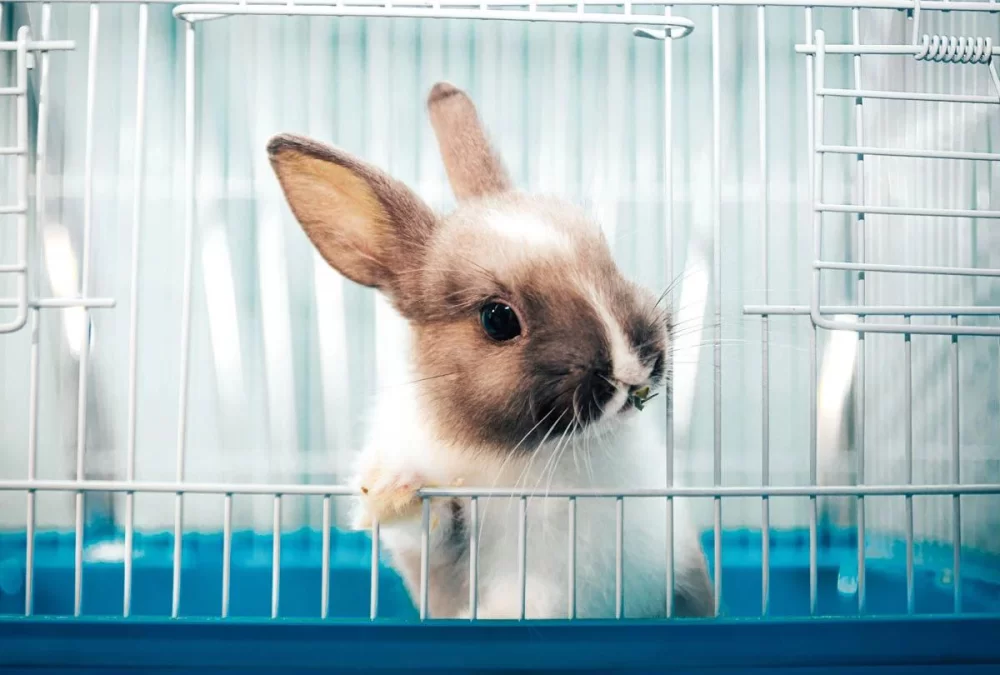- Importance-of-Cleaning-Rabbit-Cage
- Step-by-Step-Guide-to-Cleaning-a-Rabbit-Cage
- Maintaining-Hygiene-Between-Deep-Cleans
- Common-Mistakes-and-Professional-Tips
- Why-Hidden-Brook-Veterinary-is-Your-Best-Resource
1. Importance of Cleaning Rabbit Cage Regularly
Owning a pet rabbit comes with the responsibility of maintaining its living environment clean and hygienic. A clean rabbit cage is vital not only for your pet's comfort but also for preventing health issues such as respiratory infections, skin irritations, and digestive problems. Rabbits are naturally clean animals, but their cages can accumulate urine, feces, and uneaten food quickly, creating unpleasant odors and breeding grounds for bacteria.
Inadequate hygiene can lead to severe health complications that may require veterinary intervention. For example, I once encountered a story of a rabbit owner whose pet developed a severe urinary tract infection simply because the cage was not cleaned regularly. This case highlights the critical role proper cage maintenance plays in your rabbit’s well-being.
Regular cleaning also helps you notice any abnormalities in your rabbit’s droppings or behavior early, allowing timely care and preventing potential illnesses.
2. Step-by-Step Guide to Cleaning a Rabbit Cage
Cleaning a rabbit cage is a systematic process that can be broken down into manageable steps to ensure thorough hygiene without stressing your pet:

220 Commerce Blvd, Fairless Hills, PA 19030, USA
See Details2.1 Remove the Rabbit and Accessories
Start by gently relocating your rabbit to a safe, comfortable temporary enclosure. Remove all bedding, toys, food dishes, and water bottles. Discard soiled bedding and uneaten food to prevent mold and bacteria buildup.
2.2 Scrub and Disinfect the Cage
Use warm water mixed with a pet-safe disinfectant to clean the cage surfaces, including bars, base trays, and corners. Avoid harsh chemicals like bleach or ammonia, which can harm your rabbit’s sensitive respiratory system. A sponge or brush helps remove dried waste and dirt. Rinse thoroughly with clean water to eliminate any residue.
2.3 Clean Accessories and Replace Bedding
Wash food dishes, water bottles, and toys with mild soap and water. Dry them completely before putting them back. Use fresh, absorbent bedding that suits your rabbit’s needs—such as paper-based or aspen shavings—to maintain a dry and comfortable living space.
2.4 Final Check Before Returning the Rabbit
Inspect the cage for any damage or sharp edges that could injure your pet. Once satisfied, place your rabbit back in the freshly cleaned environment, ensuring it has fresh water and food.
3. Maintaining Hygiene Between Deep Cleans
Deep cleaning of the rabbit cage is ideally done weekly, but daily maintenance is equally important to keep hygiene standards high. Here’s how you can maintain cleanliness on a day-to-day basis:
3.1 Spot Clean Waste and Soiled Bedding
Remove any visible droppings or wet spots in the bedding each day. This prevents buildup and reduces odor.
3.2 Refresh Food and Water
Change your rabbit’s food and water daily to avoid contamination. Clean water bottles regularly to prevent algae or bacteria formation.
3.3 Monitor Your Rabbit’s Health
Pay attention to your rabbit’s behavior and droppings. Consistent hygiene helps you detect health changes early.
4. Common Mistakes and Professional Tips for Rabbit Cage Hygiene
Many rabbit owners unintentionally make errors that compromise cage hygiene. One frequent mistake is using inappropriate cleaning agents that irritate rabbits. Additionally, neglecting the ventilation of the cage can create a humid environment favoring bacteria and mold growth.
Professional veterinarians recommend these additional tips for maintaining ideal hygiene:
4.1 Use Natural Cleaning Solutions
Vinegar diluted in water is an effective and safe alternative for disinfecting surfaces without harsh chemicals.
4.2 Ensure Proper Cage Placement
Place the cage in a well-ventilated, shaded area to avoid heat stress and moisture buildup.
4.3 Rotate Bedding Types Occasionally
Using different types of bedding periodically can reduce the risk of allergies and maintain comfort.
These professional tips come from extensive veterinary experience and have helped countless rabbit owners maintain healthy environments for their pets.
5. Why Hidden Brook Veterinary is Your Best Resource for Rabbit Care
For rabbit owners seeking the best advice, products, and care services, Hidden Brook Veterinary offers an expert resource. Whether you need specialized cleaning products, guidance on rabbit health, or professional veterinary services, Hidden Brook Veterinary ensures your rabbit receives top-quality care.
Their knowledgeable team understands the unique needs of rabbits and can recommend the most effective hygiene products and routines tailored to your pet. By choosing Hidden Brook Veterinary, you benefit from trusted advice grounded in experience and compassion for animal welfare.
Maintaining your rabbit’s cage cleanliness and hygiene is fundamental to a happy, healthy pet life. With the right approach, patience, and support from experts, you can provide an environment where your rabbit thrives every day.











